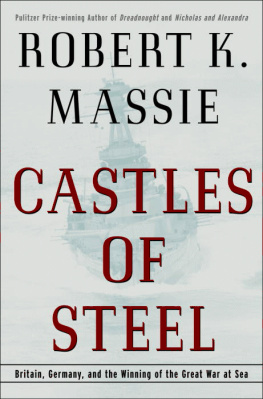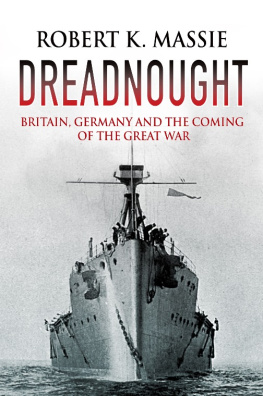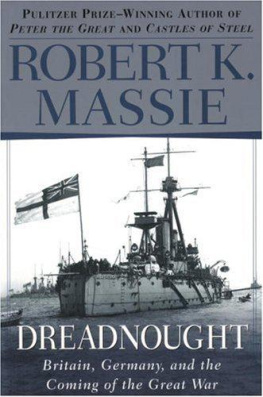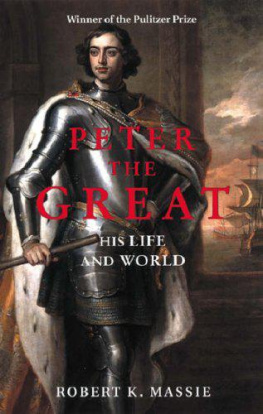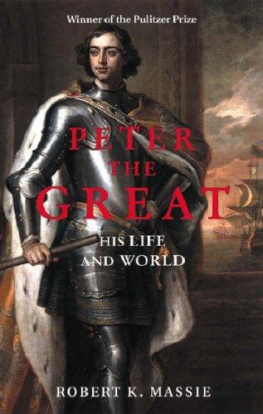Robert K. Massie - Castles of Steel: Britain, Germany, and the Winning of the Great War at Sea
Here you can read online Robert K. Massie - Castles of Steel: Britain, Germany, and the Winning of the Great War at Sea full text of the book (entire story) in english for free. Download pdf and epub, get meaning, cover and reviews about this ebook. year: 2004, publisher: Ballantine Books, genre: History. Description of the work, (preface) as well as reviews are available. Best literature library LitArk.com created for fans of good reading and offers a wide selection of genres:
Romance novel
Science fiction
Adventure
Detective
Science
History
Home and family
Prose
Art
Politics
Computer
Non-fiction
Religion
Business
Children
Humor
Choose a favorite category and find really read worthwhile books. Enjoy immersion in the world of imagination, feel the emotions of the characters or learn something new for yourself, make an fascinating discovery.
- Book:Castles of Steel: Britain, Germany, and the Winning of the Great War at Sea
- Author:
- Publisher:Ballantine Books
- Genre:
- Year:2004
- Rating:5 / 5
- Favourites:Add to favourites
- Your mark:
- 100
- 1
- 2
- 3
- 4
- 5
Castles of Steel: Britain, Germany, and the Winning of the Great War at Sea: summary, description and annotation
We offer to read an annotation, description, summary or preface (depends on what the author of the book "Castles of Steel: Britain, Germany, and the Winning of the Great War at Sea" wrote himself). If you haven't found the necessary information about the book — write in the comments, we will try to find it.
Castles of Steel: Britain, Germany, and the Winning of the Great War at Sea — read online for free the complete book (whole text) full work
Below is the text of the book, divided by pages. System saving the place of the last page read, allows you to conveniently read the book "Castles of Steel: Britain, Germany, and the Winning of the Great War at Sea" online for free, without having to search again every time where you left off. Put a bookmark, and you can go to the page where you finished reading at any time.
Font size:
Interval:
Bookmark:
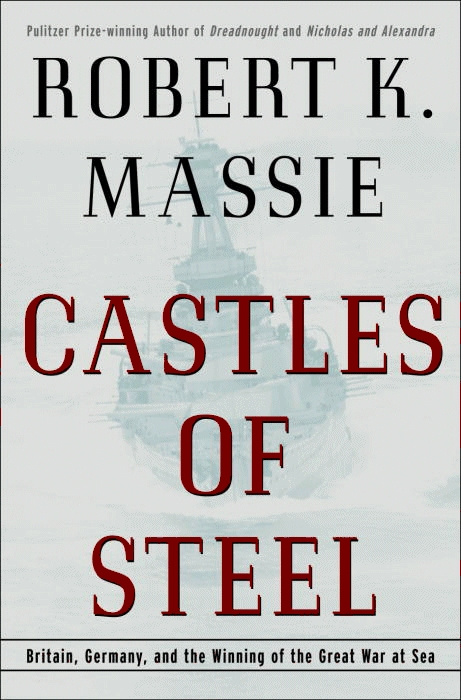
Copyright 2003 by Robert K. Massie
Contents
Title Page
Dedication
Epigraph
List of Maps
Half Title Page
Chapter 1. July 1914
Chapter 2. Goeben Is Your Objective
Chapter 3. Jellicoe
Chapter 4. First Days
Chapter 5. Beatty
Chapter 6. The Battle of the Bight
Chapter 7. Submarines and Mines: Fishers Toys
Chapter 8. Shall We Be Here in the Morning?
Chapter 9. Prince Louis Departs
Chapter 10. Admiral von Spees Voyage
Chapter 11. Admiral Cradocks Voyage
Chapter 12. The Battle of Coronel
Chapter 13. Very Well, Luce, Well Sail Tomorrow
Chapter 14. The Battle of the Falkland Islands
Chapter 15. Fisher Returns to the Admiralty
Chapter 16. The Requirements of the Commander-in-Chief Were Hard to Meet
Chapter 17. The Yarmouth Raid and Room 40
Chapter 18. The Scarborough Raid: Within Our Claws
Chapter 19. The Scarborough Raid: Hipper Escapes
Chapter 20. The Cuxhaven Raid: Stupid Great Things, but Very Beautiful
Chapter 21. The Battle of the Dogger Bank: Kingdom Come or Ten Days Leave
Chapter 22. The Battle of the Dogger Bank: Why Didnt You Get the Lot?
Chapter 23. A Demonstration at the Dardanelles
Chapter 24. The Minefields
Chapter 25. The Naval Attack on the Narrows
Chapter 26. Gallipoli: The Landings
Chapter 27. Some Corner of a Foreign Field
Chapter 28. The Blockade of Germany
Chapter 29. Lusitania and the American Reaction
Chapter 30. The Eve of Jutland
Chapter 31. Jutland: Beatty vs. Hipper
Chapter 32. Jutland: Jellicoe vs. Scheer
Chapter 33. Jutland: Night and Morning
Chapter 34. Jutland: Aftermath
Chapter 35. America Enters the War
Chapter 36. The Defeat of the U-boats
Chapter 37. Jellicoe Leaves, Beatty Arrives, and the Americans Cross the Atlantic
Chapter 38. Finis Germaniae
Endnotes
Notes
Bibliography
Acknowledgments
About the Author
Also by Robert K. Massie
For Deborah, Christopher, Sophia, and Nora
All nations want peace,
but they want a peace that suits them.
ADMIRAL SIR JOHN FISHER
Maps
The Escape of Goeben
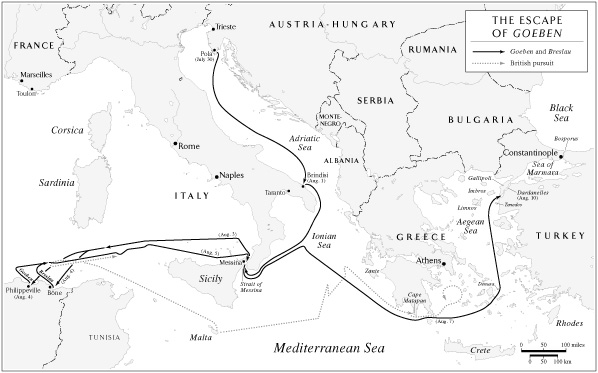
Coronel and the Falklands
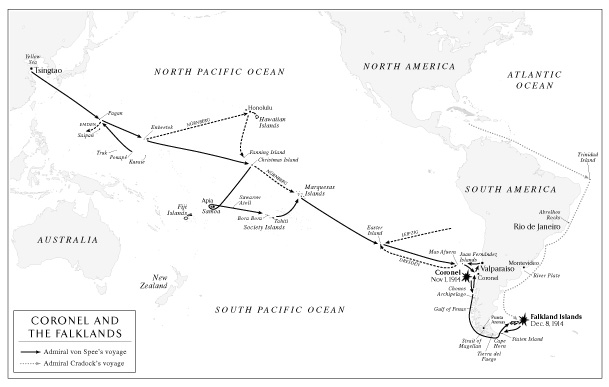
The Dardanelles and Gallipoli
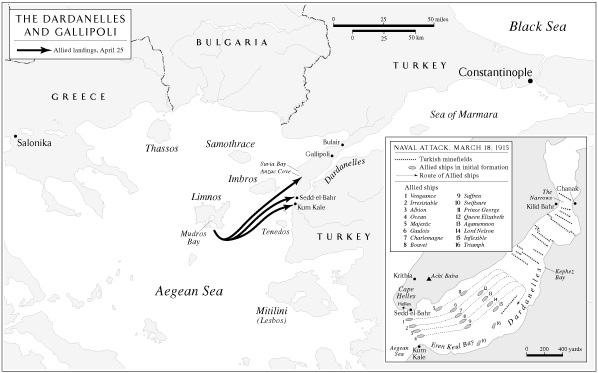
Lusitania off the Irish Coast
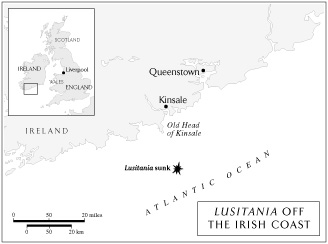
The Battle of Jutland
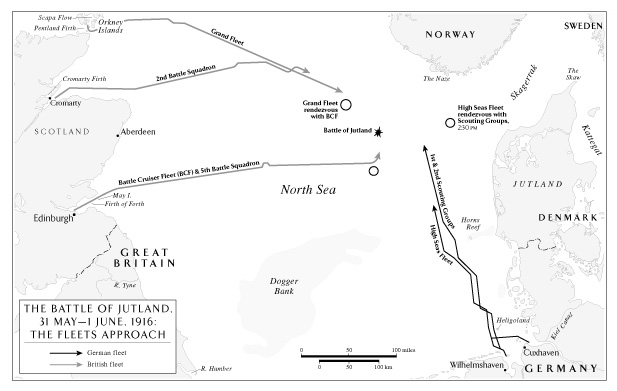
The North Sea Theater
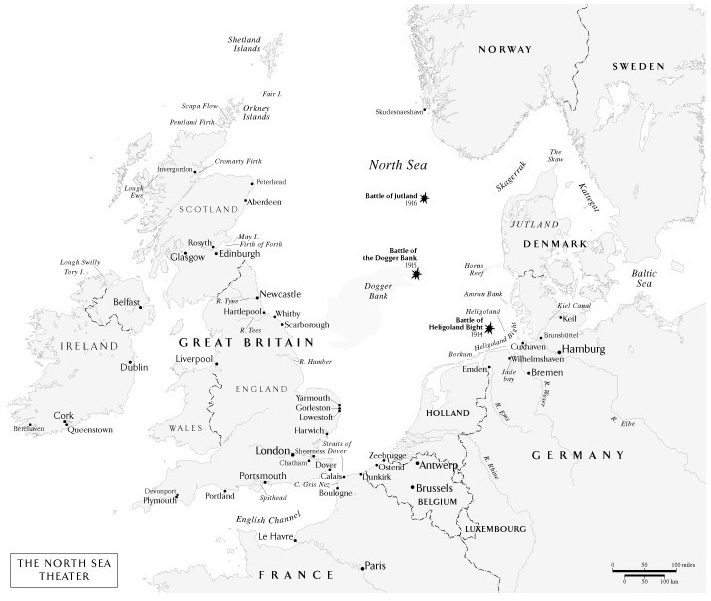
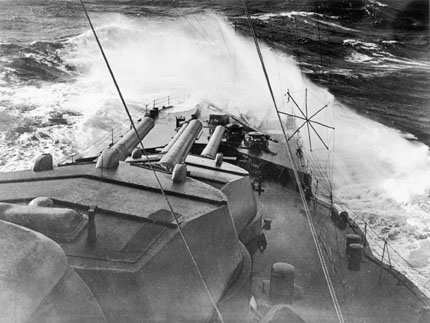
CHAPTER 1July 1914
On an afternoon in early July 1914, a middle-aged man with restless, bright blue eyes and curly, iron-gray hair boarded his yacht in the German Baltic harbor of Kiel, and the following morning departed on his annual summer cruise to the fjords of Norway. Two unusual and striking features marked the vacationing traveler: one of these he was eager to display; the other he was even more anxious to conceal. The first was his famous brushy mustache with its extended, upturned points, the creation of a skillful barber who worked on it every morning with a can of wax. The other, hidden from sight, but all the more noticeable for that, was his left arm, three inches shorter than the right. This misfortune was the result of an extraordinarily difficult breech delivery performed without anesthesia on his eighteen-year-old mother, Princess Victoria of England. He was unable to raise his left arm, and the fingers on his left hand were paralyzed. Every doctor had been consulted, every treatment attempted; nothing worked. Now, the useless hand was gloved and carried in his pocket, or placed at rest on the hilt of a sword or a dagger. At meals, a special one-piece knife-and-fork set was always placed next to his plate. To compensate for the helplessness of his left arm, he had developed the right to an unusual degree. He always wore large jeweled rings on his right hand; sometimes, grasping a welcoming hand so hard that the rings bit and the owner winced, the hand shaker said merrily, Ha ha! The mailed fist! What!
There were two sides to the travelers behavior. He was a man of wide reading, impressive although shallow knowledge, a remarkable memory for facts, and, when he wished, amiability and charm. He had a strong, clear voice and spoke equally well in German and English although his English had the slightest trace of an accent and when he resorted to English slang, which he liked to do, he frequently got it wrong. He talks with great energy, said an Englishwoman who saw him often, and has a habit of thrusting his face forward and wagging his finger when he wishes to be emphatic. If he laughs, said an English statesman who knew him, which he is sure to do a good many times, he will laugh with absolute abandonment, throwing back his head, opening his mouth to the fullest extent possible, shaking his whole body and often stamping with one foot to show his excessive enjoyment of any joke. His moods changed quickly. He could be expansive and cheery one day, irritable and strident the next. His sensitivity to suspected slights was acute, and rejection turned him quickly to arrogance and menace. Remarkably, he could switch between personalities like an actor. He had complete control of his facial expressions. In public, he tightened his features into a glowering mask and presented himself as the lofty, monarchical figure his rank proclaimed. Other times, he allowed his face to relax and a softer, milder expression appeared, one indicating courtesy and affabilitysometimes even gentleness.
This complicated, difficult, and afflicted person was Kaiser William II, the German emperor and Supreme War Lord of the most powerful military and industrial state in Europe.
The imperious side of William IIs character was the handiwork of Otto von Bismarck, the Iron Chancellor and creator of the German empire, who inflamed the young prince in his youth with the glory of monarchy. Astride a white horse, wearing the white cuirassier uniform of the Imperial Guard and a shining brass helmet crested with a golden Hohenzollern eagle, William saw himself as an embodiment of the divine right of kings. We Hohenzollerns derive our crowns from Heaven alone and we are answerable only to Heaven, he announced, adding that God was our old ally who has taken so much trouble over our homeland and dynasty. Ich und Gott were the two rulers of Germany, he declared, sometimes forgetting who was answerable to whom. You have sworn loyalty to Me, he once told a group of new army recruits. That means, children of My guard, that you... have given yourself to Me, body and soul.... It may come to pass that I shall command you to shoot your own relatives, brothers, yes, parentswhich God forbidbut even then you must follow My command without a murmur. He drew surprising historical analogies. In 1900, sending a contingent of German troops to China at the time of the Boxer Rebellion, he shouted to the departing soldiers, There will be no quarter, no prisoners will be taken! As a thousand years ago, the Huns under King Attila gained for themselves a name which still stands for terror in tradition and story, so may the name of German be impressed by you for a thousand years on China.
Next pageFont size:
Interval:
Bookmark:
Similar books «Castles of Steel: Britain, Germany, and the Winning of the Great War at Sea»
Look at similar books to Castles of Steel: Britain, Germany, and the Winning of the Great War at Sea. We have selected literature similar in name and meaning in the hope of providing readers with more options to find new, interesting, not yet read works.
Discussion, reviews of the book Castles of Steel: Britain, Germany, and the Winning of the Great War at Sea and just readers' own opinions. Leave your comments, write what you think about the work, its meaning or the main characters. Specify what exactly you liked and what you didn't like, and why you think so.

